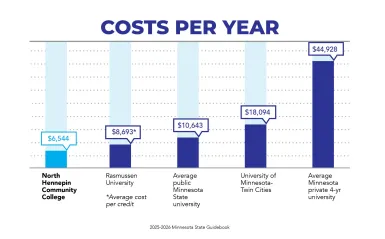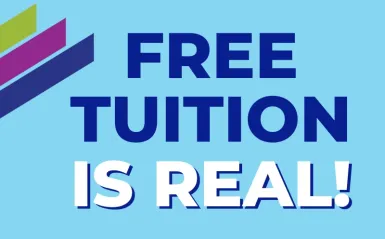Apply for Free
During the month of October, you can apply for free using promo code: CKM25
Transfer Options
NHCC's Public Administration AS Degree program is designed to transfer seamlessly to Metropolitan State University's Human Services Leadership and Administration bachelor's degree program.
Students can increase their career opportunities by continuing on to either the Public Administration Master's degree or Advocacy and Political Leadership degree at Metropolitan State University.
Public Administration Career Outlook
Whether in government, non-profit, or the private sector, creating and administering effective policy can have a significant positive impact on an organization and community. Leaders in public administration use skills gained in their education and professional experience to address important societal issues by shaping and implementing policy, projects, and programs. Students can increase their career opportunities with further education.
Entry-Level Careers
Trainee Administrative Assistant: $40-70K annually
City Clerk: $48-72K annually
Office Support Specialist: $33-62K annually
Office Support Representative: $39-51K annually
Bachelor's Level Careers
Program Manager: $56-$86K annually
Administrative Specialist: $52-$80K annually
Administrative Assistant: $48-$70K annually
Support Technician: $41-$57K annually
Master's Level Careers
Executive Director: $130-$180K annually
Director: $120-$170K annually
Contract Administrator: $80-$103K annually
Economic Support Supervisor: $78-$93K annually
Source: Approximate advertised wage range based on job postings in Minnesota April-October 2023. Wages, education and experience requirements vary by employer.
For more career and wage data, visit Minnesota Employment and Economic Development.
What is Public Administration?
Check out this short video to find out what you do with a degree in public administration.
Paying for College
NHCC's tuition is among the most affordable in Minnesota.
Financial Aid
- Scholarships are money you don't have to repay
- Grants are money you don't have to repay
Free College Tuition
The North Star Promise scholarship program provides free college tuition to eligible students. Find out if you might be eligible.
Program Roadmaps
Program roadmaps provide students with a guide to understand the recommended course sequence to complete their degree.
Get Started
If you're ready to get started, apply to NHCC. If you'd like to learn more, you can visit campus or request information.



